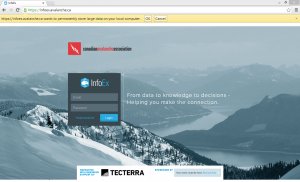| REQUIREMENTS |
| Permission |
All user levels |
| Connectivity |
Online only |
This document describes how to install the new InfoEx system onto your computer.
Background
The InfoEx system is a web application that runs in a browser. When you load the application for the first time from the URL, it is downloaded and stored in the application cache of your browser. Having it stored locally will allow you to use certain features of the application (e.g., observation entry) even when you do not have an Internet connection.
See System requirements for use of InfoEx application for details on supported configurations for the InfoEx application.
Step-by-step description
| 1.
|
Install Google Chrome Browser on your computer if you do not have it already
|
| 2.
|
Visit https://infoex.avalancheassociation.ca/ to access the latest version of the InfoEx application.
| NOTE |
When you visit this URL for the first time, the entire InfoEx application will be downloaded to your computer. Please ensure that you have a decent Internet connection as this download is approximately 6 MB. |
|
| 3.
|
 Fig. 1: Google Chrome dialog regarding local storage of large amounts of data. |
| 4.
|
Bookmark https://infoex.avalancheassociation.ca/ for future reference. This is the starting point for all of your InfoEx interactions. You will be able to start the application even without an Internet connection.
|
Related documents
Functionality tested by
- Nov. 20, 2015: Stuart Smith
